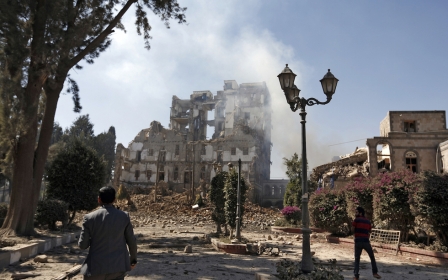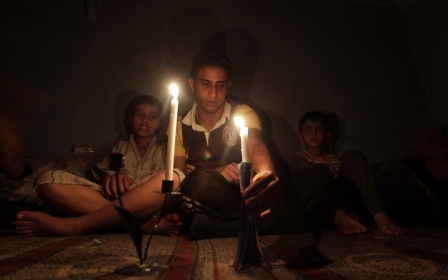US aid chief says blockade still not allowing aid into Yemen

There are no signs that a blockade of Yemen's ports by a Saudi-led military coalition has eased to allow aid to reach communities increasingly at risk of starvation, the head of the US government's aid agency said on Tuesday.
USAID administrator Mark Green called on the Saudi-led military coalition to open Yemen's ports and for Yemen's Houthis to cease firing to allow food and medical supplies to flow to tens of thousands of Yemenis caught in the fighting.
Unfortunately I can't tell you there has been an easing of the blockade.
-Mark Green, USAID administrator
Green was speaking after the US announced another $130 million in emergency food aid for Yemen, bringing US assistance to nearly $768 million since October 2016. The new funds includes nearly $84 million in food aid and $46 million in emergency disaster assistance.
"Unfortunately I can't tell you there has been an easing of the blockade," Green told Reuters. "We're trying to signal with this announcement that we're ready to respond to this humanitarian catastrophe."
Green said he was "deeply concerned on so many fronts" about the crisis in Yemen, but in particular the failure to get fuel into the country so people have access to clean water.
"That means a number of communities are either without clean water or will be very shortly, and in both cases that is a terrible concern from the cholera perspective and the survival perspective," he added.
Last week, US President Donald Trump called for lifting the siege on Yemen in a rare criticism for his Saudi allies.
"I have directed officials in my administration to call the leadership of the kingdom of Saudi Arabia to request that they completely allow food, fuel, water, and medicine to reach the Yemeni people who desperately need it," Trump said in a statement.
"This must be done for humanitarian reasons immediately."
The UN's coordinator for Yemen, Jamie McGoldrick, said on Monday the blockade has been eased but the situation remained dire with some 8.4 million people "a step away from famine."
A Saudi-led military coalition fighting the Houthi movement blockaded ports last month after a missile was fired toward Riyadh.
Washington last week warned Saudi Arabia that concern in Congress over the humanitarian situation in Yemen could affect US assistance to allies in the Saudi-led coalition, including the US refuelling of coalition jets and some intelligence sharing.
World Food Programme (WFP) also warned on Tuesday of a “humanitarian catastrophe” in Yemen if the blockade persists
"We are trying to help prevent a famine from occurring," Stephen Anderson, Yemen director for WFP told the Thomson Reuters Foundation on Tuesday.
"We will have a large-scale humanitarian catastrophe of a much larger magnitude than we currently face if commercial vessels carrying food and fuel can't get in. It will be beyond the control of the humanitarian community."
Yemen, a nation of 28 million people, imports more than 85 percent of its food and medicine.
Problems are particularly acute in hospitals, which rely on fuel to run generators, medical charities say.
Stay informed with MEE's newsletters
Sign up to get the latest alerts, insights and analysis, starting with Turkey Unpacked
Middle East Eye delivers independent and unrivalled coverage and analysis of the Middle East, North Africa and beyond. To learn more about republishing this content and the associated fees, please fill out this form. More about MEE can be found here.




